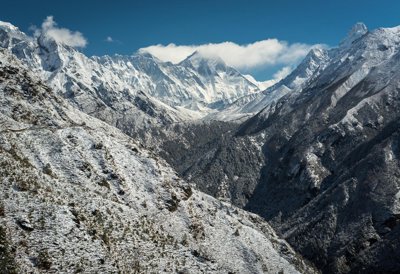How did you get to where you are now?
I have always loved being outdoors, especially exploring the amazing countryside around North Yorkshire, where I grew up. Combine this with a passion for maps and the knowledge imparted by a couple of fantastic teachers, and my love of geography was born. I went on from studying the subject at GCSE, A Level and S Level to reading it at the University of Manchester, where I took as many modules as possible relating to climatology, glaciation, cartography and spatial science.
A desire to get some fresh air at weekends and to continue exploring different parts of the country, led me to sign up to the University Officer Training Corps, an organisation that provided me with an insight into life within the UK Armed Forces. I never had any intention of joining the Army, but after making some amazing friends and developing a passion for leading and managing soldiers, I decided to apply for a Short Service Commission.
Following 12 months of training at the Royal Military Academy Sandhurst, I was commissioned in to the Corps of Royal Engineers as a Lieutenant. After two amazing years in Germany and a couple of deployments overseas to construct hospitals, runways and desert camps, I returned to the field of geography, volunteering to attend the Long Army Survey Course, at the Royal School of Military Survey. The 14 month long MSc in Defence Geographic Information Systems ultimately opened the route to the job I am in today – Commanding Officer of 42 Engineer Regiment (Geographic), the Army’s only deployable unit that provides geospatial and geographic advice to leaders and decision makers across defence.
Was there anything particularly useful that helped you get into this role?
Personally, I think the military and geography go hand in hand – everything happens somewhere, and a commander’s plans will always be affected by the local terrain, the weather and the environment. It’s a perfect marriage for me, one that has helped me through a 20 year career in the Royal Engineers, which has seen me visit countless countries and undertake numerous operational tours.
What do you do as part of your role?
I lead and manage an organisation of approximately 450 civilian and military personnel, all of whom are focused on delivering the following to defence:
-
We are ready to deploy anywhere in the world to advise commanders on how the physical and human terrain may impact future military operations.
-
We help visualise the operating environment on physical products (maps) and virtually in the digital space.
-
We analyse the geospatial and geo-temporal environment to provide answers to the what, the where, and the why?
-
We provide a unique, high precision, deployable geodetic survey capability to undertake a range of defence tasks, including the use of drones and LiDAR scanners to create 3D models.
The soldiers and officers within my Regiment are all trained at the Royal School of Military Survey and receive either a BSc degree or MSc on completion of their training. My principle role is to ensure that when they deploy they are suitably trained, equipped and ready to face the challenges of operating in a dynamic and demanding environment. Recently we have sent people out on exercises and operations across the world, including in response to humanitarian disasters in the Caribbean, flooding in the UK and even Brexit planning!
What skills and characteristics do you need for this role, apart from geographical knowledge?
To be an army officer you need to be fit, robust and happy to deal with complexity and challenge. Good communication skills, both written and verbal, as well and as ability to plan are essential – however, many of these can be learnt throughout the training conducted at the Royal Military Academy Sandhurst. To be a military geographer you need all of this as well as a good understanding of geographic systems, analytical modelling, critical thinking and common sense. A good sense of humour also helps!
How does geography feature in your work/what difference does it make?
Without a good understanding of the terrain and the environment that a military commander is operating within, their plans are almost certain to fail. Geography affects everything – especially where you site specific assets and how you manoeuvre safely across the terrain.
What advice would you give to someone wanting to go in to this career?
Be proud to be a geographer! Studying geography helps provide clarity from complexity, it helps you order your thoughts and think logically – skills that are essential in any career, not just the military. I have benefited significantly from following a duel career path, one that dips in and out of mainstream engineering and the geographic specialism. As a result, I am a huge advocate of gaining wide ranging and broad experiences. Embrace change, look for new challenges and understand that you are never too old to learn new skills.
Why did you choose geography? Why should others choose geography?
Geography helps us to describe and understand our surroundings – both in the physical and human environment. More importantly, everything happens somewhere, which therefore makes geography the centre of everything!
I have been lucky enough to travel to some remarkable places around the world and I love the fact that my geography journey helps me to appreciate the amazing environment in which we live. Studying geography provides you with a range of skills that will set you up for any successful career. It is so much more than learning capital cities and colouring in – ultimately, geography helps to unlock the secrets to our world!
* This interview was undertaken in 2019 and was correct at the time of publication. Please note that the featured individual may no longer be in role, but the profile has been kept for career pathway and informational purposes.
Lieutenant Colonel Paul Hammett
Job title: Commanding Officer 42 Engineer Regiment (Geographic)
Organisation: The British Army, Ministry of Defence

